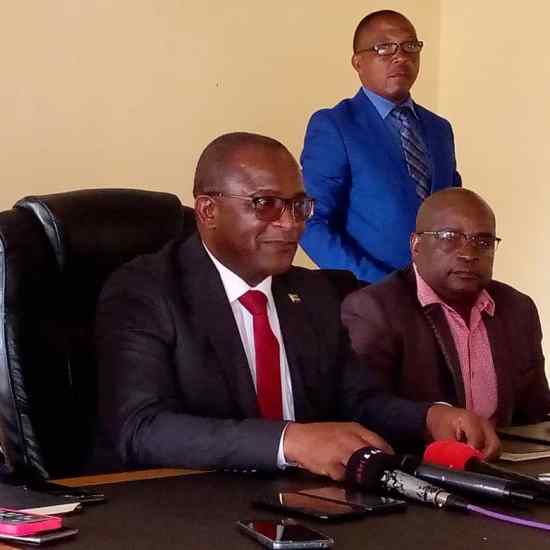
MUTOKO- People gather at a funeral in a farming community of Marira in Mutoko. Men and women move around the yard as they go about their duties at the funeral.
By Own Correspondent
Party regalia dominates the clothes that are worn. Women with wraps that bear the face of their party candidate President Emmerson Mnangagwa and men with t-shirts and caps with Zanu PF logos are visible.
Marwei Mangindo (38) is one of those women. She says she has a collection of the wraps from the ruling party. She even used one of the wraps to have an outfit made.
“l voted for Zanu Pf because of these things, they gave us clothes, umbrellas, caps and other items, who can say no to that?” Marwei says as she helps her husband carry fertilizer into the house distributed under the presidential input scheme.
Zimbabwe had its harmonised elections on 30 July 2018; the opposition political parties accused the ruling party of election rigging and vote buying because of the party-state conflation challenged the election, which was marred with post-election violence.
In the 2018 election the main contenders for the presidential seat were Emmerson Dambudzo Mnangagwa for Zanu PF and Nelson Chamisa under the MDC Alliance. Mnangagwa won the presidential seat.
In Mtoko South were the investigation was carried out, Herbert Shumbambinhi who was contesting under ZANU PF won the National Assemmbly seat with 20283 followed by Mapengo Mapango of the MDC Alliance who had 2839 votes, Beaullah Mburundu of the MDC-T had 265 votes and Joe Rangarirai Chipfeva of the NCA who had 223 votes (Link).
According to the Zimbabwe International Electoral Observer Mission report on the 2018 elections, the ruling ZANU-PF relied heavily on state resources in campaigning with little differentiation between the state and the party. The report further notes that there were also widespread reports of the partisan distribution of government food aid and agricultural inputs to coerce support for the ruling party (See link). The Anti-Corruption Trust of Southern Africa report also notes that there were widespread cases of vote buying throughout the country (link). The report further notes that voters who are offered money or material goods in exchange for their votes reciprocate because they experience pleasure in increasing the material payoffs of the politician who has helped them.
Mangindo says she never received any free things from other opposition parties.
“Why would l vote for people who haven’t given me anything, what we want is to be given staff like this wrap that l have,” she says.
Gloria Kufandirori, another resident of Marira says she didn’t get anything, but she wishes that she had something to show that she got from the elections.
“There was too much scramble for these things because they were under demand, many people appreciated the free staff that they got mainly from Zanu PF and l think that made them vote for the party in this area,” she says.
Simon Khaya Moyo, Zanu Pf spokesperson says his party distributed goods and food in order to win the vote.
“Our party distributed a lot of items as campaigning materials for people to know what we were promising them,”
“Whether that influenced their vote or not l wouldn’t know because lm not in their minds,” he says

“We distributed things such as caps, t-shirts, wraps, umbrellas and so forth,” says Khaya Moyo.
Herbert Chouriri a resident of Mutoko who works for a community human rights organisation says vote buying was rampant during the election period in Mutoko.
“l was not given anything but l saw people being given food,
Zanu Pf candidates were given privilege to preside over distribution of government food handouts and farming inputs. This exercise gave them more electoral advantage than their competing candidates did. This is clear abuse of national resources and vote buying,” he says.
The reporter conducted a survey with 20 people who reside in Mutoko. Questionnaires were distributed and the results showed that 25 percent of the sample were influenced by the goods they received which include maize, tshirts, food supplies and wraps. 75 percent said they were not influenced by the goods. Of the 75 percent 33.3 percent did not accept goods that were being offered and 66.6 percent accepted the goods but say their voting choice did not change because of the goods they received.
However, Lawrence Mhandara a political scientist says vote buying in the 2018 elections had insignificant impact.
“The voting choices were varied and not determined by hand-outs like the presidential inputs which were distributed towards elections,” he says.
Mhandara adds that some of the people who received goods did not vote for ZANU PF.
“If you compare the election results for 2013 and 2018 in Mashonaland East, more people voted for ZANU PF in 2013 than they did in 2018.
Mhandara says the prevailing economic situation made vote buying not to work as it used to because people were more concerned of their future than what they get on a short term basis.
Douglas Mwonzora secretary general for Movement for Democratic Change Alliance says 2018 election was characterised with vote buying.
“It is clear that food was used as a campaign tool by Zanu PF,” he says
Mwonzora says that Zanu PF used the distribution of food as a distraction when other political parties had meeting.
He adds that as MDC Alliance they did not distribute anything because they did not have the resources and it is against the electoral laws of the country.
“If we had resources, we would distribute whatever we have to every Zimbabwean regardless of their political affiliation.
Results from the survey carried out were inconclusive and it cannot be determined whether the voting patterns in the 2018 elections were influenced by goods that people were given during election campaigns.








